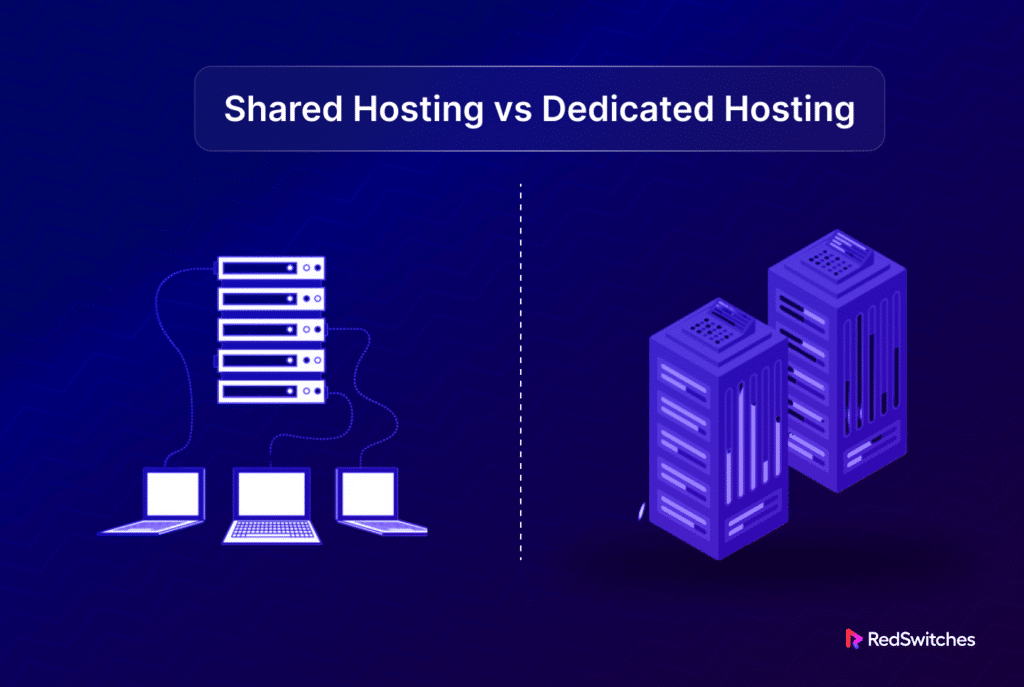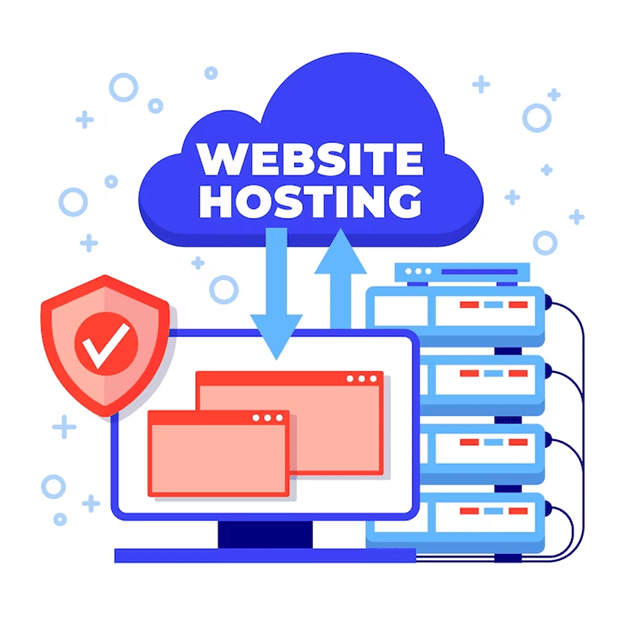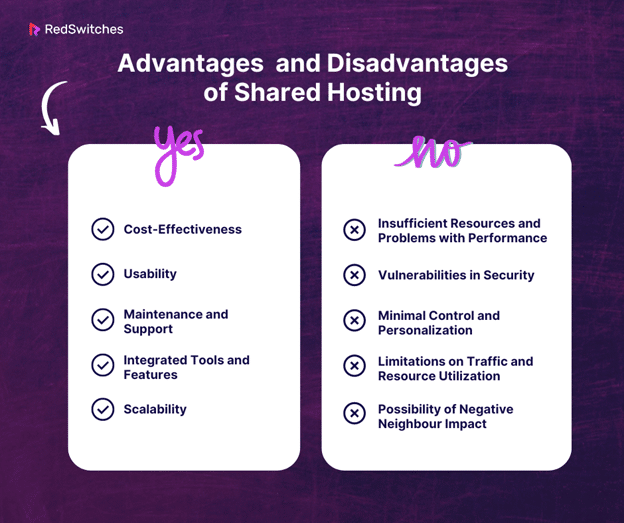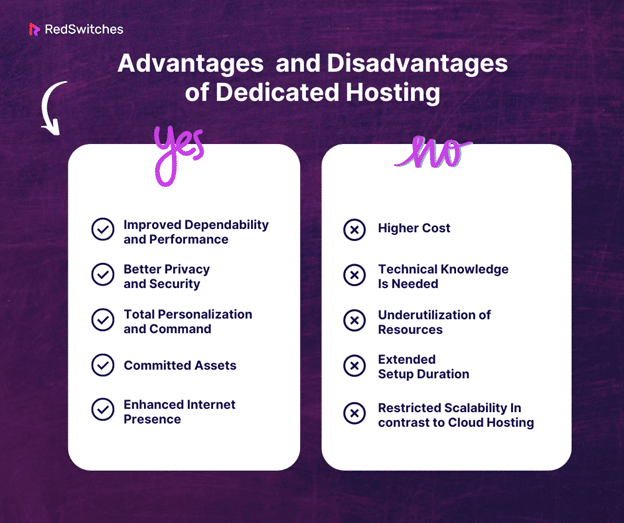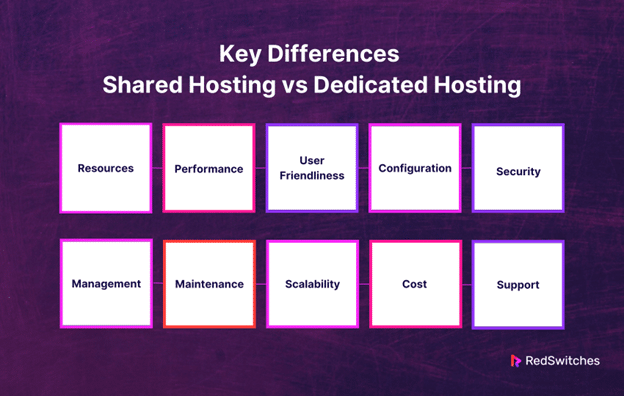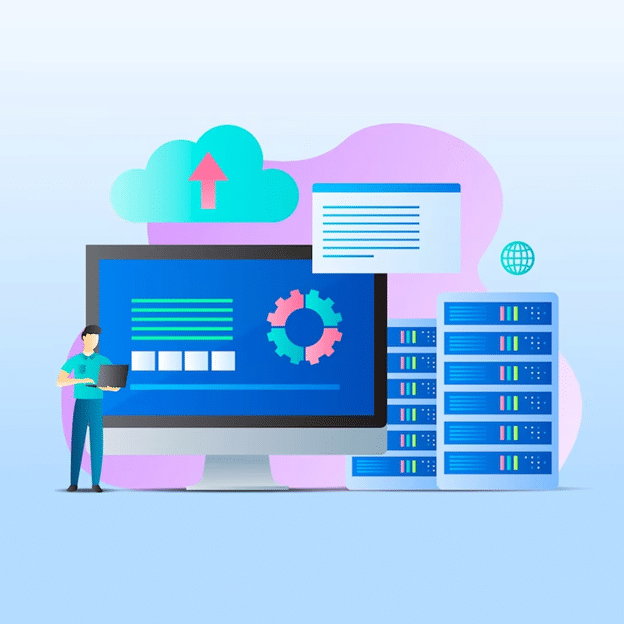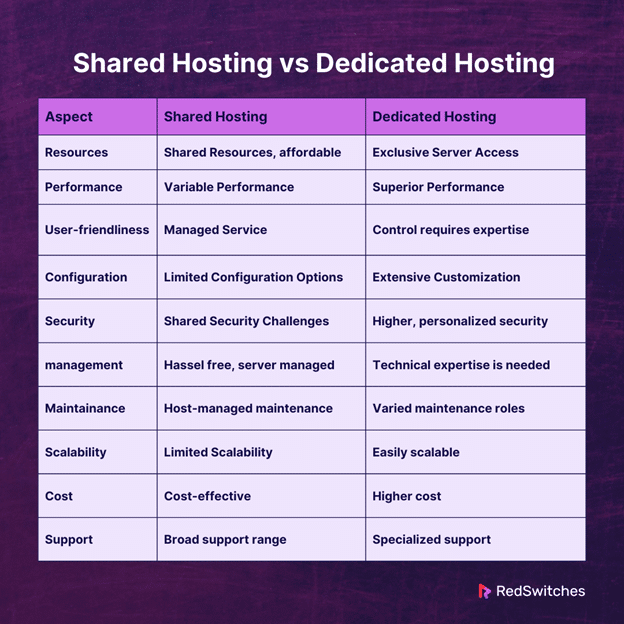Key Takeaways
- Shared hosting is cost-effective and user-friendly, making it ideal for individuals, small businesses, and those just starting their online presence.
- Dedicated hosting offers improved performance, enhanced security, and complete control over server resources.
- Shared hosting plans often include integrated tools and features like CMS website builders and one-click installers.
- Dedicated hosting allows for total customization and command over the server.
- The main drawbacks of shared hosting include limited resources and potential performance issues due to the “bad neighbour” effect.
- The higher cost, need for technical knowledge, potential underutilization of resources, and longer setup times are significant considerations for dedicated hosting.
Picking the right hosting provider is like choosing the cornerstone of your online presence today. You need to grasp the differences between shared and dedicated hosting. You also need to understand their features.
This thorough guide shows the main differences between dedicated and shared hosting. It covers their features, performance, security, and costs. The hosting industry can be intimidating to navigate. This is true regardless of your experience level as a developer, entrepreneur, or anywhere.
We aim to simplify this decision-making process. We will give you the information to choose a hosting solution that meets your current needs and hopes for future growth.
- Key Takeaways
- What is Shared Hosting?
- Advantages And Disadvantages Of Shared Hosting
- What is Dedicated Hosting?
- Advantages And Disadvantages Of Dedicated Hosting
- Key Differences Shared Hosting vs Dedicated Hosting
- Conclusion
- FAQs
What is Shared Hosting?
Credits: Freepik
Many people and small-to-medium-sized enterprises like shared hosting. It is affordable and popular for creating an online presence. Shared hosting means hosting multiple websites on one server. The websites share the server’s resources, including bandwidth, CPU, RAM, and disc space. Since the hosted websites can split the costs due to this collaborative approach to hosting, shared hosting is a desirable choice for individuals on a tight budget or just getting started.
On shared hosting, the hosting company handles all server management. This includes upkeep, security patches, and technical assistance. This hands-off attitude frees website owners from worrying about the infrastructure. They can then focus on their website’s business and content. The shared environment can handle modest traffic. It is right for small businesses, personal blogs, and low-traffic websites.
Shared hosting is still popular. It is cheap, simple to use, and has many features. These features include pre-installed scripts, website builders, and one-click installations for well-known programs and content management systems.
Advantages And Disadvantages Of Shared Hosting
Now let’s talk about the advantages and disadvantages of shared hosting:
Advantages of Shared Hosting
Let’s Discuss the Benefits of Shared Hosting in detail.
Cost-Effectiveness
Of all the web hosting options, shared hosting is the most affordable. The affordability comes from shared operational costs. These divide the costs of running and keeping the server among its users. These costs include hardware, electricity, and internet access. This strategy saves a lot of money. So, shared hosting is now an appealing entry point for new website owners, small businesses, and startups with tight budgets. It lets them spend more money on other key parts of their company. These parts include marketing, development, and content production.
Usability
Shared hosting services are known for their user-friendliness. To make hosting a website easier, providers offer a control panel. Like Plesk or cPanel, it has a graphical interface and automation features. They can create databases and email accounts. They can also install web apps and schedule backups. Its approachable nature has made server management less intimidating to people without technical experience. This has opened up shared hosting to a wider audience.
Maintenance and Support
In a shared hosting environment, the server’s technical upkeep is the hosting provider’s duty. This includes ensuring security precautions are taken, the server’s software is current, and it operates at peak efficiency. Furthermore, hosting companies give support services to help consumers with any problems they could encounter with their hosting. This support includes comprehensive knowledge bases, forums, and round-the-clock customer care. This shared hosting feature is quite helpful for users who are not tech-savvy or would rather concentrate on running their business than on technological upkeep.
Integrated Tools and Features
Shared hosting packages frequently include several integrated tools and features intended to assist customers in creating, managing, and improving their websites. These can include email hosting services, one-click installers for well-known content management systems (CMS) like WordPress, Joomla, or Drupal, and website builders that let users make a website without knowing any code. Furthermore, basic security tools like virus scanning and SSL certificates are frequently included in shared hosting plans to help shield websites from common dangers.
Scalability
Although shared hosting is a great place for many websites to start, it also provides expansion opportunities. Most hosting companies allow simple upgrades to more robust hosting options, such as VPS or dedicated hosting, as a website’s traffic and resource requirements grow. Because of this scalability, websites can expand, still function efficiently, and offer a positive user experience without redesigning their hosting infrastructure completely.
Disadvantages of Shared Hosting
We will now discuss the disadvantages of Shared Hosting.
Insufficient Resources and Problems with Performance
The fact that resources are shared is one of the biggest disadvantages of shared hosting. Since numerous websites are housed on a single server, they all share resources like CPU time, memory, and disc space.
This may cause performance problems. This is especially so if one or more hosted websites run resource-hungry programs or see more traffic. Under such issues, all websites on the server may load slower and work worse. These rules can be a big problem for companies. Their website speed and performance are vital for user experience and search engine results.
Vulnerabilities in Security
Dedicated hosting solutions are often thought to be more secure than shared hosting environments. Since numerous users can access the same server, the security of other accounts may be jeopardized by the activities of one account. For instance, other websites on the server can be at risk if a hacker uses one of the websites on the server. Dedicated environments have separate server resources. They are less vulnerable to security breaches than shared ones. Even though hosting providers work to minimize these risks.
Minimal Control and Personalization
In shared hosting, users can’t change server settings. These settings are configured by hosting providers to support a broad spectrum of users, which implies that personalization choices are limited. This could be a disadvantage for websites that need particular software versions, server setups, or settings to function at their best. This lack of control may be prohibitive for users with sophisticated hosting requirements, particularly if they plan to employ certain software stacks or build unique applications that the shared hosting environment does not support.
Limitations on Traffic and Resource Utilization
Most shared hosting plans have set usage caps on disc space and bandwidth, and going over these caps may result in extra fees or a temporary suspension of service. Websites that see regular high traffic levels or abrupt jumps in volume may soon surpass shared hosting. This limitation makes it difficult for websites to maintain continuous performance and availability without adding additional fees, especially for those developing quickly or anticipating fluctuations in traffic numbers.
Possibility of Negative Neighbour Impact
In shared hosting situations, one prevalent worry is the “bad neighbour” effect. When one or more websites on the same server use excessive resources, it affects the performance of other websites hosted on the same server. This is known as a scenario. This may result in slower loading times and reduced responsiveness for the impacted websites. This effect can be lessened by hosting providers managing resource utilization, but there is still a risk associated with the shared hosting approach.
What is Dedicated Hosting?
Credits: Freepik
Dedicated hosting is a high-end web hosting option in which a single client has a whole server for their website or collection of websites. This exclusive resource allotment starkly contrasts shared hosting, which allows resources to several users on a single server. Dedicated hosting is a powerful and customizable hosting solution because the client has complete control over the server, including selecting the operating system, hardware, and specific specifications.
Dedicated hosting provides a big benefit in terms of security. Customers can put in place their security measures, such as firewalls, security protocols, and antivirus software, based on their requirements. Because dedicated hosting takes a customized approach to security, it is the best option for companies that deal with sensitive data or transactions, including financial institutions, eCommerce sites, and healthcare providers, where data security and privacy are critical.
Dedicated hosting is more expensive than shared or virtual private servers (VPS). Higher levels of customization, enhanced security and performance, and exclusive usage of the server’s resources are all reflected in the price. More technical competence is needed to operate and maintain the server.
Advantages And Disadvantages Of Dedicated Hosting
Now let’s talk about the advantages and disadvantages of shared hosting:
Advantages of Dedicated Hosting
Let’s Discuss the Benefits of Dedicated Hosting in detail.
Improved Dependability and Performance
The increase in website performance and dependability is the main advantage of dedicated hosting. Since just one client uses the server’s resources, there is no rivalry for CPU, RAM, or disc space. As a result, websites can handle lots of traffic and processing. They do this without the slowdowns that shared systems have. This is vital for companies. Their SEO and customer satisfaction rely on uptime and fast loading.
Better Privacy and Security
Your website is housed in a more secure environment with dedicated hosting. You won’t have cross-site contamination or security breaches. They can’t happen because you don’t share the server with others. Clients can install the software to secure critical data. They can also customize firewalls and security protocols. They can do this thanks to having full control over the server’s security settings. Websites managing sensitive transactions, personal data, or those subject to regulatory compliance obligations require this level of protection.
Total Personalization and Command
Using dedicated hosting, clients can freely configure and personalize the server to meet their unique needs. You have total control over the server environment. You choose the operating system (OS) and applications. You also set up the server’s configuration and security features. This flexibility is crucial for companies with special technological needs or those trying to maximize the effectiveness and performance of their online infrastructure
Committed Assets
All of the server’s resources are allocated to a single customer with dedicated hosting, unlike shared or virtual private server (VPS) hosting. This implies that you don’t have to worry about other websites’ resource utilization affecting the functionality of your website because you have access to all of the CPU power, memory, and storage space. Large e-commerce sites, traffic-heavy websites, and resource-intensive applications can especially benefit from this.
Enhanced Internet Presence
You receive a distinct IP address when you use dedicated hosting. This implies that a spamming website on a shared server can harm the IP’s reputation. But, on your server, your website’s reputation is safe from other users’ conduct. Businesses with e-commerce websites or needing SSL certificates for secure transactions should prioritize getting a dedicated IP address. It will guarantee email delivery and other communications.
Disadvantages of Dedicated Hosting
Now Let’s focus on the Disadvantages of Dedicated Hosting.
Higher Cost
The most significant drawback of dedicated hosting is its cost. You rent an entire server. So, the monthly or annual fees are much higher than those for shared or VPS hosting. This higher price covers the cost of using the server’s resources exclusively. It also covers advanced security. And it covers the potential for customization and scalability. But, for small businesses, startups, or sites with moderate traffic, the cost of dedicated hosting may not justify the benefits. So, it is a less viable option when budget is a concern.
Technical Knowledge Is Needed
More technical know-how is frequently needed to manage a dedicated server than in the case of shared or VPS hosting. This includes making servers faster. It also involves setting up software and security. And it includes keeping server hardware working. Solutions exist for managed dedicated hosting. The hosting company handles upkeep and technical assistance. But, you pay for these services separately. Dedicated hosting can have a steep learning curve. It can also have higher operating costs. These are problems for businesses without an internal IT staff or for people who lack technical skills.
Underutilization of Resources
The possibility of underusing resources is an additional drawback. Regardless of how much you utilize the server’s resources, you pay for them when you use dedicated hosting. This may create scenarios. Companies pay for more power, bandwidth, or capacity than their websites truly need. Although dedicated hosting offers scalability, it can be difficult to forecast future requirements. Thus, some companies may be over-equipped but under-using their server’s potential.
Extended Setup Duration
A dedicated server may require more setup time than shared or VPS hosting. The setup may take longer. The server is configured for your unique needs. This includes custom settings, installing apps, and an operating system. This could be a disadvantage for companies with a tight deadline for a project or launching their web presence.
Restricted Scalability Unlike Cloud Hosting
Cloud hosting options offer more on-demand scalability than dedicated servers. They are also scalable in terms of hardware. Growing a dedicated server may need new servers or upgrades. But cloud hosting enables real-time changes to handle traffic spikes. Due to this more involved and time-consuming approach, dedicated hosting becomes less adaptable in quickly changing situations.
Key Differences Shared Hosting vs Dedicated Hosting
In this core section of our blog, we will discuss the key differences in the Shared Hosting vs Dedicated Hosting Debate.
Resources
In the first section of our Shared Hosting vs Dedicated Hosting debate, we will compare their Resources.
Shared Hosting
In a shared hosting setup, several websites share the server’s resources, such as CPU power, RAM, disc space, and bandwidth. This implies that a fraction of the server’s overall resources are available to each website hosted on it. The main benefit of this arrangement is its affordability. This makes shared hosting desirable for individuals, bloggers, and small enterprises. They have light traffic and resource needs. However, because resources are shared, websites hosted on the same server may operate differently. This happens when there is a lot of traffic or resource-intensive tasks from one website. Websites’ speed may change due to this shared resource approach. This is especially true during busy times.
Dedicated Hosting
On the other hand, dedicated hosting gives one client sole access to a server’s resources. This indicates that one website or a network of associated websites is the exclusive user of the server’s CPU, RAM, disc space, and bandwidth. Large e-commerce platforms, high-traffic websites, and companies with special data and hosting needs can benefit greatly. They benefit from dedicated hosting. It ends resource sharing, greatly improving website performance and reliability.
Performance
Credits: Freepik
In this part of the Shared Hosting vs Dedicated Hosting argument, we will discuss the performance of both.
Shared Hosting
Several websites share resources in shared hosting. So, performance in this setting can vary. A shared server means that all websites compete for the same resources. So, one website’s resource demands or traffic surges can hurt other websites. This means websites may get slower. They may also have outages during peak hours. Smaller websites have less traffic. Performance issues are less likely for them. So, they are usually better suited for shared hosting.
Dedicated Hosting
Dedicated hosting performs better than shared hosting. It does so because it gives you sole access to the server’s resources. A website is unique. It can handle high traffic and demanding jobs without being slowed by other websites. Dedicated servers are highly adjustable. They can be optimized to meet specific needs like large-scale e-commerce, database management, or high-traffic content delivery.
User Friendliness
Let’s Compare the ease of use in the Shared Hosting vs Dedicated Hosting debate.
Shared Hosting
Shared hosting is well-known for being user-friendly. It is a great option for novices and people with little technical experience. Hosting companies offer managed services. The services handle software upgrades, security patches, and server maintenance. They free consumers to focus on their website’s content, not its technical details. A control panel like Plesk or cPanel offers a graphical interface. It lets users control website elements like email accounts, databases, and apps. Many shared hosting packages include a control panel.
Dedicated Hosting
Compared to shared hosting, dedicated hosting offers unmatched control and customization, but it also necessitates greater technical proficiency. Users have complete control over their server, including selecting the operating system, installing software, and setting up particular configurations. This degree of control makes it possible to optimize the server to match the needs of a website or application precisely. Still, it also makes knowledge of server management and maintenance procedures necessary.
Configuration
Let’s compare the configuration of both concerning the Shared Hosting vs Dedicated Hosting debate.
Shared Hosting
Because of the nature of the service, there aren’t as many configuration possibilities in a shared hosting environment. Because several users share the server’s resources, hosting companies limit the degree of customization that each website can have to keep everything stable and safe for all of their customers. Users usually have limited access to server settings and cannot install bespoke software or apps that ask for server-level changes. However, these restrictions do not pose a major obstacle for many customers, particularly those who are just starting out or have basic websites.
Dedicated Hosting
Dedicated hosting gives customers complete control over their server environment by offering various configuration and customization choices. Users can install any software or programs, change server settings, change hardware configurations to suit their demands, and select the operating system that best suits their needs. Businesses with exceptional needs, including those requiring specialized security measures, high-performance databases, or custom software solutions, will find this level of control especially advantageous.
Security
Let’s compare the Security of both concerning the Shared Hosting vs Dedicated Hosting debate.
Shared Hosting
Because several users share server resources, security in a shared hosting environment poses special difficulties. Multiple websites running on the same server can create weaknesses, even while hosting providers use strong security measures to guard the server from common threats. Other websites hosted on the same server may be at risk if one website is compromised. Furthermore, users are mostly dependent on the security upgrades and protocols provided by the hosting provider, with little influence over the security specifications of the server.
Dedicated Hosting
Because the server’s resources are not shared with other users, dedicated hosting provides higher security. Because of this exclusivity, there is a far lower chance of cross-site contamination, and users can apply personalized security measures based on their requirements. Clients can set up firewalls, install cutting-edge security software, and impose stringent access controls and protocols to protect critical data because they have complete control over the server.
Management
Let’s compare the management of both concerning the Shared Hosting vs Dedicated Hosting debate.
Shared Hosting
Shared hosting is meant to be hassle-free. It is for users who lack technical skills or prefer to avoid server management. Hosting companies manage the server. This includes maintenance, security patches, and updates. Website owners can focus on their website’s content. They can worry less about the technical details. This is thanks to the managed service approach.
Dedicated Hosting
Dedicated hosting appeals to users with particular needs. It also appeals to those seeking the greatest speed and security. It offers more control over server management. Clients who own dedicated servers can administer and customize the server as they see fit. They can install unique software, set certain security protocols, and configure the server in great detail. However, this level of management necessitates a greater level of technical expertise or the assistance of a knowledgeable IT team.
Also read Web Application Security 101: What It Is, How It Works, Best Practices, & More
Maintenance
Let’s compare the Maintenance of both concerning the Shared Hosting vs Dedicated Hosting debate.
Shared Hosting
The hosting company bears the most maintenance costs in a shared hosting setting. This involves routine software upgrades and security patches. It also includes server monitoring and technical troubleshooting. They ensure the server runs well and safely. Users can focus on their website’s design and content with less technical maintenance. They need not worry about the underlying infrastructure.
Dedicated Hosting
The upkeep duties for dedicated hosting can differ greatly. It depends on whether you choose an unmanaged or managed package. The customer oversees all server maintenance. It’s an unmanaged dedicated hosting setup. This includes backups, security, software upgrades, and hardware problems.
Scalability
In this part of the Shared Hosting vs Dedicated Hosting argument, we will discuss Scalability.
Shared Hosting
Because resources are shared, scalability is constrained in a shared hosting environment. Shared hosting may not be right for websites that are growing quickly or have changes in traffic. But, it can be a great place to start for smaller websites, personal blogs, or companies with low to moderate traffic. A shared hosting plan’s limited resources may not be enough to accommodate an expanding website’s traffic or resource demands, which could cause performance problems.
Dedicated Hosting
Regarding performance management and resource allocation, dedicated hosting offers higher scalability. As the website’s needs grow, adding more resources (like RAM, CPU power, or disk space) is much simpler. This is because the server allocates its resources to a single client. Because of this direct control over the server environment, performance can be precisely scaled to meet the website’s demands, even with increased traffic.
Shared Hosting vs Dedicated Hosting: Cost
In this part of the Shared Hosting vs Dedicated Hosting argument, we will discuss the cost.
Shared Hosting
One of the best features of shared hosting is its low cost, making it a very popular option for people on a tight budget, small organizations, and individuals wishing to create an online presence. Shared hosting is so inexpensive because it divides server resources among several customers, allowing the hosting company to charge each client separately for server upkeep and operation.
Dedicated Hosting
This type of hosting is more expensive than other options for web hosting. You can dedicate a whole server’s resources to a single client. This provides unmatched performance, security, and customization options. It justifies the high fee. Due to this exclusive access, shared hosting’s resource rivalry is eliminated, offering a dependable and stable environment customized to each client’s unique requirements. Dedicated hosting serves websites and enterprises with high traffic volumes, specialized application requirements, or enhanced security needs despite its significantly higher initial and continuing expenses.
Shared Hosting vs Dedicated Hosting: Support
Finally, let’s discuss the support of both:
Shared Hosting
In a shared hosting setting, support is typically designed to accommodate a wide spectrum of customers, from novices to more seasoned website operators. Hosting companies usually guarantee that assistance is always available by providing round-the-clock support through various channels, such as live chat, email, and phone. The support staff helps with routine problems like setting up websites, creating email accounts, and performing simple troubleshooting.
Dedicated Hosting
Due to the more involved nature of maintaining a dedicated server, support for dedicated hosting clients is often more extensive and specialized. A greater level of support, such as dedicated account managers and access to a team of technical specialists who can help with advanced server configurations, is frequently available to customers with dedicated hosting plans.
Let’s summarize it in a tabular format.
Shared Hosting vs Dedicated Hosting: Which one to choose?
Now, let’s discuss when to choose whom.
Select shared hosting If
- You either have a tiny to medium-sized website with little to moderate traffic or you’re just getting started. A cost-effective entry point is provided by shared hosting.
- You wish to create a web presence while keeping operating expenses to a minimum because you have a tight budget.
- If you are not tech-savvy or would rather not deal with security upgrades and server upkeep, the hosting company takes care of these things.
Select Dedicated Hosting If
- You have a website that receives a lot of traffic, or you expect it to develop significantly. You need more resources and faster speed than shared hosting can offer.
- Security is crucial, particularly if you manage sensitive data or conduct sensitive transactions (like an e-commerce site) and need to implement cutting-edge security measures.
- Your server environment, comprising particular hardware, operating systems, and software configurations, requires much personalization and control.
Conclusion
You must consider many criteria. These include price, performance, security, scalability, and tech know-how. You need to weigh them when choosing between shared and dedicated hosting. Shared hosting provides an inexpensive and easy-to-use alternative for small- to medium-sized websites.
This makes it a great place to start for those new to the internet or with resource-constrained requirements. Dedicated hosting offers the resources, security, and customization. It is for websites with heavy traffic and companies with particular needs.
RedSwitches distinguishes itself as a supplier ready to help you. They do this by providing various hosting options. These options are tailored to different needs. Whether you are scaling up to a dedicated server or starting small with shared hosting, we offer reliable infrastructure. We also provide first-rate support to ensure your online presence is strong and resilient.
FAQs
1. Which hosting is better shared or dedicated?
The best choice relies on your website’s needs. Dedicated hosting gives you control and performance. Shared hosting is simpler and cheaper.
2. What are the disadvantages of shared hosting?
Shared hosting can have performance problems. It can also lack resources and offer fewer customization choices.
3. What is the difference between shared hosting and semi-dedicated hosting?
Semi-dedicated hosting provides more resources and fewer sites per server. It has better performance than shared hosting, which puts many websites on one server with shared resources.
4. What is the difference between shared hosting and dedicated hosting?
Shared hosting involves multiple websites sharing resources on a single server, while dedicated hosting provides a server exclusively for one website.
5. What are the pros and cons of shared hosting?
Shared hosting is cost-effective and easy to set up, but it may have limitations in terms of server resources and performance due to sharing with other websites.
6. What are the benefits of dedicated server hosting?
Dedicated server hosting offers high performance, better security, and full control over server resources for a single website.
7. How do I choose the right hosting option for my website?
Consider factors like your website’s traffic volume, resource requirements, budget, and technical expertise when choosing between shared hosting and dedicated hosting.
8. Can I use shared hosting for my website?
Shared hosting is suitable for small to medium websites with moderate traffic and resource needs.
9. What services are typically included in shared hosting and dedicated hosting plans?
Shared hosting plans usually offer basic hosting services, while dedicated hosting plans include premium features like dedicated IP addresses and enhanced security options.
10. How does the hosting provider differ in shared vs dedicated hosting?
In shared hosting, multiple websites are managed by the same server, while dedicated hosting provides a server exclusively for one website managed by the hosting provider.
